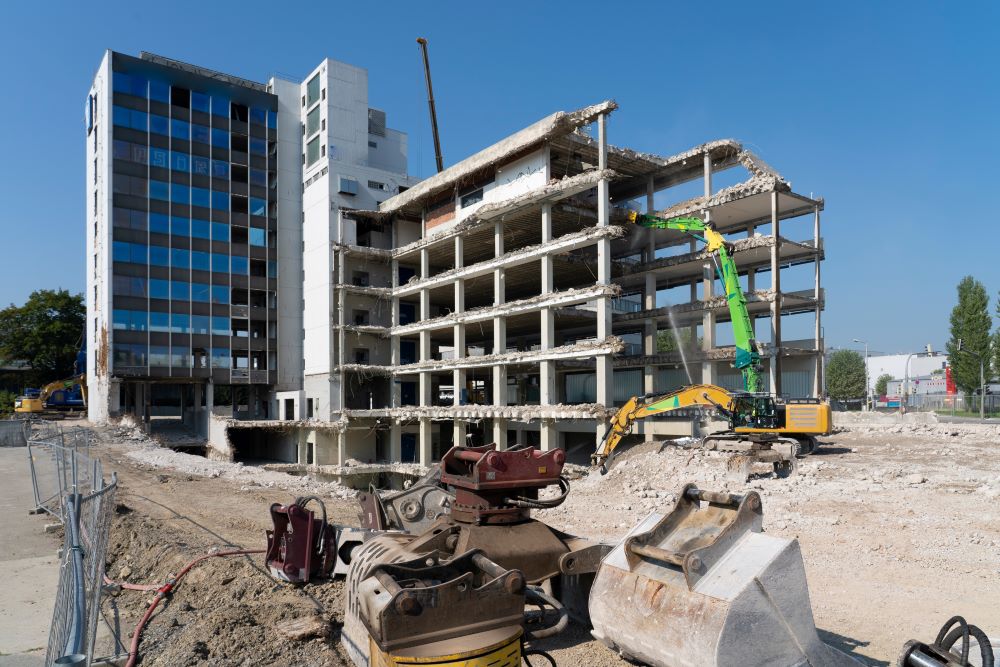
The Economics of Industrial Demolition Company
Do you want to know how an industrial demolition firm operates on the inside? There’s nowhere else to look. This essay will go into the intriguing field of industrial demolition economics and identify the critical elements that support these businesses’ growth and prosperity. Urban growth and sustainability greatly benefit from industrial demolition, which involves anything from demolishing buildings to reusing materials.
We will explore the financial implications of this niche market, looking at prospective income sources, the expenses associated with demolition, and the financial effect on different stakeholders.
OUR SERVICES
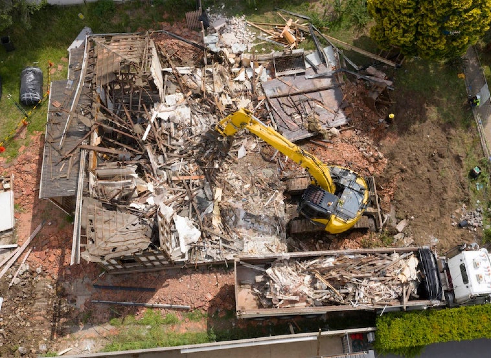
Structure Demolition. Residential, Commercial & Industrial
If your structure poses a health, safety, or environmental risk, demolition can prevent costly citations or fatal accidents. While this may seem daunting, you are just a phone call away from having your residential demolition done professionally, responsibly, and at a great price.
Talk to a Demolition Specialist Now! 916.249.5001
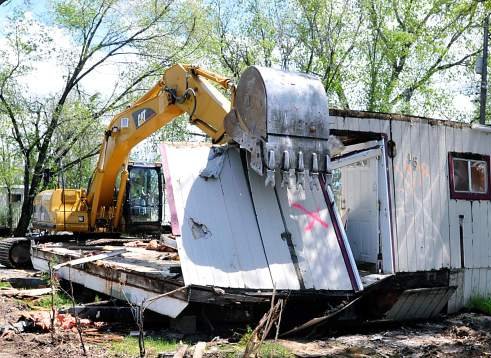
Mobile Home Demolition
We demolish and haul away mobile homes. Any size, anywhere, anyhow. We are fast, clean and competitive. We serve most of Northern California. There are many factors to consider when removing or demolishing your old trailer, mobile home, or manufactured home like: the processes involved, costs, time, contractors, debris, and permits.
Talk to a Demolition Specialist Now! 916.249.5001
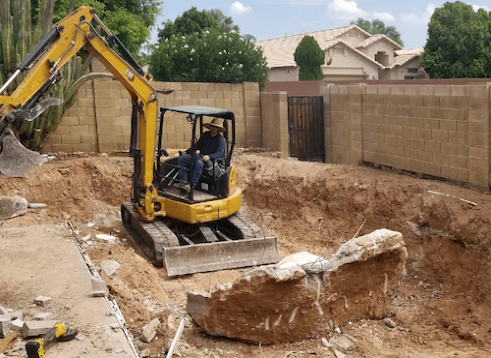
Pool Demolition
When removing a pool in Sacramento, California with the professional demolition team of Maxton Demo, you’re guaranteed peace of mind from beginning to end. From your initial request for an estimate to clean-up, you can expect our pool demolition process that’s completely professional and safe.
Talk to a Demolition Specialist Now! 916.249.5001

Floor Demolition
Flooring demolition, like any other major home renovation work, requires a specific set of skills and tools to be performed properly. You need experts in flooring demolition to get you the best floors possible. Contact us to find out more about how we can help you today.
Talk to a Demolition Specialist Now! 916.249.5001
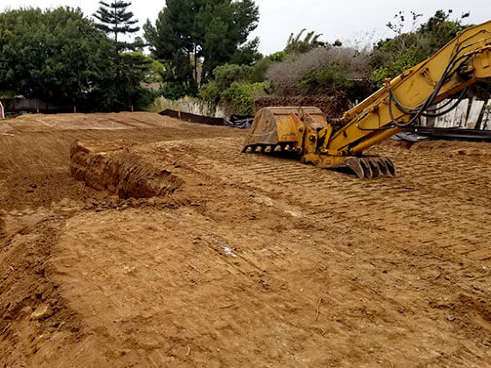
Grading & Excavating
If you need an experienced excavator and grader in Sacramento, call us today. One of the many reasons that residential, commercial, and industrial customers choose to work with us is because we’re able to provide a broad range of services to help construction-related projects get done in less time and at a reduced cost.
Talk to a Demolition Specialist Now! 916.249.5001

Roof Snow Removal
Heavy snow & ice dams can cause significant roof and home damage. Roof Snow removal is our specialty during the winter months. Serving the Sacramento, California area for 10 years, we can get your roof snow removed and promise a quick response and reasonable rates.
Talk to a Demolition Specialist Now! 916.249.5001
Industrial Demolition’s Significance to the Economy
The economy depends heavily on industrial destruction since it makes infrastructural construction and urban redevelopment possible. Dismantling old buildings makes room for new developments, promoting economic expansion and reviving local communities.
Furthermore, industrial demolition businesses help create jobs by hiring qualified individuals for a range of positions, including project management and on-site operations. These businesses have a big impact on how an area’s economy develops because they clear land quickly and get it ready for development.
Moreover, the economic importance of the demolition sector goes beyond the simple dismantling of buildings. Metals, concrete, and wood that are collected from demolition sites may be recycled and used in new ways, creating more economic possibilities.
By selling the items that may still be recovered, this environmentally friendly method not only cuts waste but also makes money. Because of this, industrial demolition businesses support the circular economy by encouraging resource efficiency and reuse, in addition to stimulating the economy via demolition projects.
Industrial Demolition Projects’ Economic Impact
Industrial demolition projects have a ripple effect on the economy that affects many different sectors, ranging from small local enterprises to regional development efforts. Economic activity in the surrounding region soars when industrial facilities are removed to make room for new construction or redevelopment.
An increase in demand will help companies that provide supplies and services for demolition projects, which will boost the economy as a whole.
Moreover, industrial demolition may raise surrounding property values by demolishing dilapidated or outmoded buildings. Demolition initiatives make areas more attractive to both investors and inhabitants by getting rid of eyesores and safety issues. An increase in property prices broadens the local tax base, which gives local governments more money to spend on public services and infrastructure.
Furthermore, jobs at all skill levels—from environmental professionals to demolition technicians—are produced by industrial demolition operations. The money paid to employees in the demolition sector encourages consumer spending, which supports the economy even more.
Industrial demolition operations have a wide range of economic effects, including changes in employment rates, property prices, commercial activity, and community development programs.
The financial advantages of using skilled industrial demolition companies
Employing an expert industrial demolition firm may provide project owners and other stakeholders with a number of financial advantages. Professional demolition contractors ensure that projects are finished safely, effectively, and within budget by bringing specific knowledge, resources, and experience to the table. Project owners may reduce hazards, prevent expensive delays, and achieve better results by giving demolition responsibilities to trained specialists.
Professional industrial demolition firms also follow safety regulations and industry best practices, which lowers the risk of mishaps or environmental issues while demolition work is underway.
These businesses minimize possible liabilities and legal risks by putting safety and compliance first. By doing so, they safeguard the health and safety of their employees, the general public, and the environment. The value proposition of using expert demolition services is improved overall by this dedication to professionalism and safety.
Professional demolition contractors also have the tools, resources, and expertise needed to take on jobs of all sizes and complexity. These organizations possess the ability to provide effective and efficient solutions, whether they are clearing an industrial site in a rural region or dismantling a high-rise structure in an urban environment.
Professional industrial demolition contractors increase cost-efficiency, minimize downtime, and optimize project timeframes by using their resources and skills. This creates long-term value for their customers.
Eco-Friendly Methods for Industrial Demolition with Financial Gains
Using sustainable techniques in industrial demolition has financial benefits for communities and businesses in addition to environmental benefits. Industrial demolition firms may save disposal costs, make money from recovered materials, and improve their image as environmentally conscious businesses by emphasizing recycling, reclamation, and trash reduction.
Reducing the industry’s carbon footprint and encouraging resource efficiency are two benefits of sustainable demolition techniques, which are in line with the ideas of the circular economy.
Removing valuable elements for recycling or reuse after selectively demolishing a building is a popular sustainable practice in industrial demolition. Through thorough building deconstruction and on-site material segregation, enterprises may optimize the recovery of recyclable resources such as concrete, wood, and metals.
By selling these recovered materials to recyclers or repurposing them in brand-new building projects, a closed-loop system that minimizes waste and conserves resources may be established.
Moreover, operational and financial benefits might result from the use of energy-efficient technology and procedures during demolition work. Businesses may minimize their influence on the environment and cut down on energy usage and carbon emissions by implementing strategies such as optimizing transportation routes for garbage disposal or employing sophisticated demolition equipment with reduced emissions.
Industrial demolition firms may become more competitive, draw in eco-aware clientele, and help create a more sustainable and greener future by making sustainability investments.
Prospective Developments in the Industrial Demolition Economy
A number of significant factors are affecting the dynamics of the business and the economics of demolition projects as the industrial demolition sector develops. The growing focus on technological innovation and acceptance in demolition procedures is one notable development.
Businesses are using cutting-edge equipment to improve production, efficiency, and safety. Examples of these products include sophisticated demolition robots for precise disassembly and drones and laser scanning technology for site inspection.
Furthermore, the planning and execution of demolition projects using digital twin and building information modeling (BIM) is transforming project management and decision-making procedures. Businesses may reduce risks, enhance resource allocation, and expedite project timeframes by modeling buildings digitally and simulating demolition scenarios.
Businesses can envision complicated projects, spot possible problems, and optimize operations for better financial results by using BIM-driven demolition tactics.
The emphasis on sustainable and circular economy techniques is another new development in the economics of industrial demolition. To lessen their negative effects on the environment and increase their economic efficiency, businesses are progressively using ecologically friendly demolition practices, including deconstruction, material recovery, and garbage diversion.
Industrial demolition businesses may generate value from trash, encourage resource conservation, and set themselves apart in a crowded market by adhering to the principles of the circular economy.
Industrial Demolition Companies’ Challenges with Budgeting and Resource Management
Industrial demolition businesses have several obstacles to properly managing budgets and resources, even with their extensive experience. The dynamic nature of demolition projects, which may be impacted by variables beyond the company’s control, is one of the main problems.
Unexpected market swings, regulatory changes, and structural problems may all have an influence on project budgets and schedules, requiring quick decisions and resource reallocation. Industrial demolition businesses must continue to manage their resources and budget flexibly in order to meet changing needs without sacrificing project goals in order to lessen these difficulties.
Striking a balance between quality and cost-effectiveness is a major problem for industrial demolition businesses. Although keeping costs down is of the utmost importance, skimping on resources or sacrificing safety requirements might have unintended repercussions.
A sophisticated approach to budget and resource management is necessary to strike a balance between the requirements of cost control and the need to produce high-quality outputs. Industrial demolition firms can manage this fine balance and guarantee that projects are finished on schedule, under budget, and to the highest levels of quality and safety by emphasizing openness, responsibility, and careful planning.
The industrial demolition industry’s competitive environment makes managing resources and budgets even more difficult. Industrial demolition businesses must constantly innovate and set themselves apart from the competition in order to remain ahead of the curve in a market where many firms are fighting for contracts and market share. The need for effective budget and resource management as a strategic differentiator is highlighted by this pressure from the competition.
Industrial demolition companies can gain a competitive advantage by streamlining their operational procedures, utilizing technology, and investing in employee training. This will enable them to offer value-driven solutions that put efficiency, sustainability, and affordability first and draw in clients.
Essential Techniques for Efficient Budgeting and Resource Administration
Industrial demolition businesses use many critical tactics to produce cost-effective and efficient solutions while also excelling in budget and resource management. Establishing strong project planning and control tools is one such tactic.
Industrial demolition businesses may proactively manage budgets and resources, recognizing possible hazards and opportunities early in the project lifecycle, by doing complete site evaluations, creating precise work plans, and setting clear project milestones. They can make well-informed judgments, manage resources efficiently, and prevent expensive delays or overruns thanks to this proactive strategy.
Successful budget and resource management in industrial demolition also requires effective teamwork and communication. Maintaining transparent and unobstructed channels of communication among various project stakeholders, such as clients, contractors, regulatory bodies, and internal teams, is vital to guaranteeing that projects remain on schedule and under budget.
Industrial demolition businesses may improve resource efficiency, expedite decision-making processes, and resolve problems quickly by cultivating a culture of responsibility, openness, and cooperation.
Industrial demolition businesses may provide outstanding outcomes for their customers by collaborating with suppliers, subcontractors, and other industry players to further improve the efficacy and efficiency of budget and resource management initiatives.
In industrial demolition, technology is essential for improving resource and budget management. Technological advances enable industrial demolition businesses to optimize their operations, expedite workflows, and enhance decision-making processes. Examples of these developments include improved demolition equipment and state-of-the-art project management software.
Companies can precisely plan demolition operations, perform accurate site assessments, and evaluate structural integrity with the use of drones, 3D modeling software, and building information modeling (BIM) technologies. Project monitoring tools and real-time data analytics provide insightful information about resource allocation, budgetary constraints, and project performance, enabling businesses to make data-driven choices that maximize efficiency and save costs.
Industrial demolition firms may remain ahead of the curve and serve their customers better by using technology as a strategic facilitator of budget and resource management.
Process of Budgeting for Industrial Demolition Projects
Industrial demolition projects have a complex budgeting process that requires careful planning, in-depth research, and strategic decision-making. Industrial demolition firms do thorough site inspections at the beginning of a project to determine the extent of the work, identify possible dangers, and set financial constraints.
These businesses use their knowledge and experience to provide thorough cost estimates that take into consideration personnel, supplies, machinery, permits, disposal costs, and backup plans. These projections form the basis of the project budget, directing the distribution of resources, monitoring of expenses, and preparation of financial reports during the course of the project.
Project managers are essential in keeping an eye on and managing project expenses as industrial demolition projects go forward to guarantee that resources are used effectively and budgets are followed. Through the use of comprehensive cost control procedures, including frequent budget reviews, variance analysis, and performance reporting, project managers are able to detect budgetary deviations, look into the underlying reasons, and take necessary remedial action.
Industrial demolition businesses may preserve financial discipline, maximize resource allocation, and ensure project profitability by using a proactive approach to budget management.
Effective risk management techniques are also essential for efficient budgeting in industrial demolition projects. Through early identification and evaluation of possible risks, industrial demolition businesses may create plans for risk mitigation that guard against financial repercussions such as delays, overruns, and other setbacks.
Risk assessments, scenario analysis, and contingency planning are essential parts of the budgeting process that help businesses prepare for and handle unanticipated problems that could occur throughout the project. Industrial demolition businesses may improve project resilience, reduce financial uncertainty, and guarantee the timely and budgeted completion of their projects by including risk management in their budgeting framework.
Allocating and Using Resources in Industrial Demolition
Effective budget management in industrial demolition requires careful consideration of resource allocation and use. To guarantee that projects are finished on schedule, under budget, and in accordance with the necessary quality standards, these businesses must carefully manage their resources, which include people, machinery, supplies, and subcontractors.
Industrial demolition businesses may optimize resource use, eliminate waste, and enhance productivity throughout the project lifecycle by creating resource allocation plans that are in line with project milestones and deliverables.
A large portion of the resources used in industrial demolition operations are labor-intensive. Professionals such as engineers, project managers, skilled workers, and others are crucial to the effective completion of demolition tasks. To satisfy project needs, industrial demolition firms must carefully evaluate labor requirements, pinpoint skill shortages, and hire or train staff as required.
These businesses may raise employee morale, productivity, and performance via labor allocation optimization, workload distribution equilibrium, and the promotion of a culture of ongoing learning and growth. This will increase project success and customer satisfaction.
In industrial demolition projects, machinery and equipment are also essential resources that allow businesses to carry out demolition operations in a safe, effective, and economical manner. Specialized machinery is essential for tearing down buildings, clearing trash, and disposing of garbage. Examples of this equipment include excavators, cranes, hydraulic shears, and concrete crushers.
To improve operating efficiency and safety, industrial demolition businesses need to invest in new technology, perform routine maintenance inspections on their fleet of equipment, and maintain it. These businesses may increase efficiency, decrease downtime, and provide customers with better outcomes by investing in cutting-edge technology, scheduling equipment optimally, and matching equipment use to project needs.
Another crucial component of resource allocation in industrial demolition operations is material management. Industrial demolition businesses have to handle a wide range of materials ethically and sustainably, from recyclable commodities like steel, concrete, and wood to hazardous materials like asbestos and lead.
These organizations may limit trash creation, lower disposal costs, and encourage environmental stewardship by putting waste management strategies, recycling efforts, and material recovery programs into practice. The use of strategic sourcing, inventory management, and waste disposal procedures may augment the efficiency of resource consumption, empowering industrial demolition businesses to accomplish their project goals while reducing their environmental impact.
The Future of Industrial Demolition’s Budget and Resource Management
The future of budget and resource management is full of promise and possibility as industrial demolition firms negotiate an ever-changing world characterized by technological developments, sustainability imperatives, and competitive constraints. These businesses may improve cost management, streamline operations, and provide customers with better results by adopting cutting-edge technology, eco-friendly procedures, and cooperative alliances.
The industry’s future will be shaped by training and development programs that give staff members the abilities and know-how needed to excel in resource and budget management. These programs will also drive operational excellence and promote an innovative and continuous improvement culture.
Strategic planning, careful execution, and a dedication to quality are necessary for the complex task of managing finances and resources in industrial demolition. Industrial demolition companies can effectively navigate challenges, optimize efficiencies, and provide cost-effective and environmentally sustainable solutions that align with the changing demands of the construction industry by embracing sustainable practices, leveraging advanced technologies, and taking a proactive approach to budget and resource management.
Budget and resource management in industrial demolition will continue to play a crucial role in the growth and innovation of the industry, influencing the viability and longevity of businesses operating in this challenging and fast-paced field.
Do you have a Question?
Talk to a Demolition Specialist Now! 916.249.5001
Request Formal Quote